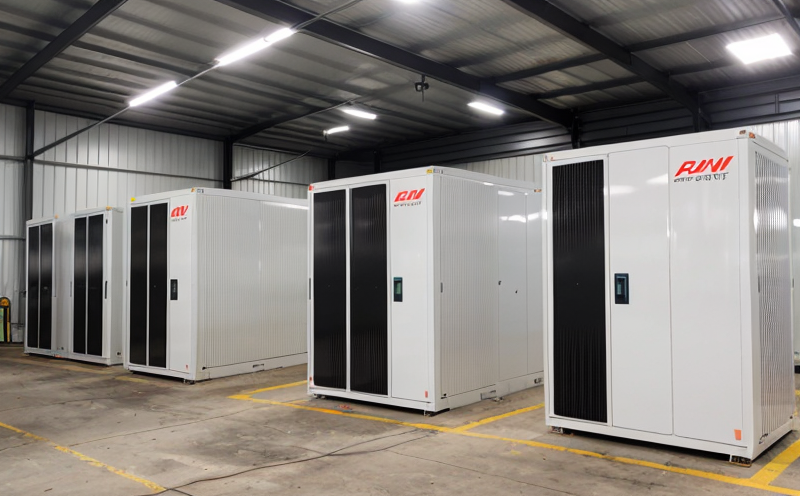IEC 62619 Safety Testing of Rechargeable Batteries for Industrial Use
The International Electrotechnical Commission (IEC) Standard IEC 62619 is a critical framework that ensures the safety and reliability of rechargeable batteries used in industrial applications. This standard covers various aspects including structural integrity, electrical safety, thermal management, and mechanical stability. Compliance with this standard is essential for manufacturers to meet regulatory requirements and ensure product quality.
Rechargeable batteries are central to modern industrial operations, powering a wide range of devices from electric vehicles (EVs) to stationary energy storage systems (ESS). These batteries must be designed and tested to withstand harsh environments and frequent charging cycles. IEC 62619 addresses these challenges by providing comprehensive test procedures that evaluate the safety and performance of rechargeable batteries under realistic conditions.
The standard requires rigorous testing across multiple domains, including:
- Electrical integrity checks to prevent short circuits
- Thermal stability tests to ensure safe operation temperatures
- Mechanical strength assessments to withstand physical stresses
- Pressure and vibration resistance tests for robustness in industrial settings
The testing process involves subjecting batteries to controlled conditions that simulate real-world usage. This includes high-temperature storage, low-temperature performance evaluation, charge/discharge cycling, and accelerated life testing. These procedures help identify potential weaknesses early in the development cycle, ensuring products are robust enough for industrial environments.
Compliance with IEC 62619 is not only a legal requirement but also enhances brand reputation by demonstrating commitment to product safety. For quality managers and compliance officers, adherence ensures that batteries meet stringent regulatory standards set by bodies like the European Union's New Regulatory Framework (EuRopean Regulations for End-of-Life Vehicles - eRoVa). R&D engineers benefit from the detailed insights gained during testing, which can inform design improvements.
For procurement teams, knowing a supplier’s compliance status is crucial. Eurolab, as an accredited laboratory specializing in energy and renewable energy testing, offers comprehensive IEC 62619 services to help clients navigate these requirements effectively.
Why It Matters
The importance of safety testing cannot be overstated when it comes to industrial rechargeable batteries. These batteries are often deployed in critical applications where failure could lead to significant financial loss or even personal injury. The standards provided by IEC 62619 serve as a safeguard, ensuring that only reliable and safe products reach the market.
Compliance with these tests helps manufacturers:
- Avoid costly product recalls
- Reduce insurance premiums through demonstrated safety practices
- Increase customer trust and loyalty by delivering dependable products
- Meet international regulatory requirements, particularly in regions like the EU and USA
The standards are not merely guidelines but enforceable regulations. Non-compliance can result in fines or even bans on product sales within certain jurisdictions. Therefore, investing in thorough testing is a prudent business decision.
Beyond legal compliance, adhering to these tests also contributes positively to the environment by promoting the use of safer and more efficient batteries. This aligns with broader sustainability goals that many industrial organizations are adopting.
Eurolab Advantages
As a leading provider of IEC 62619 testing services, Eurolab brings several advantages to clients seeking to ensure the safety and reliability of their rechargeable batteries:
- Accreditation & Expertise: Our team comprises experts with extensive experience in energy and renewable energy testing. We are accredited by leading bodies like ISO/IEC 17025, ensuring our tests meet international standards.
- Comprehensive Testing Capabilities: Eurolab offers a full suite of services to cover all aspects of IEC 62619, from initial design reviews to post-production testing. Our state-of-the-art facilities and advanced instrumentation ensure precise and reliable results.
- Sustained Quality Assurance: We provide continuous quality assurance through regular audits and updates based on the latest industry best practices and regulatory changes.
- Dedicated Client Support: Our client-centric approach ensures that we work closely with you to understand your specific needs and deliver tailored solutions. This includes guidance on test specifications, specimen preparation, and detailed reporting.
In addition to our technical expertise, Eurolab also offers significant cost savings through efficient testing processes and streamlined communication channels. By partnering with us, clients can focus more time and resources on innovation rather than compliance.
Why Choose This Test
Selecting the right battery for industrial use is a critical decision that impacts operational efficiency, safety, and environmental sustainability. IEC 62619 offers several compelling reasons why this testing should be part of your product development process:
- Enhanced Safety: The standard ensures that batteries are safe to operate within industrial settings, minimizing the risk of accidents or failures.
- Regulatory Compliance: By meeting IEC 62619 requirements, you ensure your products comply with global regulations and can enter markets without delays.
- Improved Product Quality: Rigorous testing helps identify and rectify issues early in the development cycle, leading to higher-quality final products.
- Enhanced Reputation: Demonstrating compliance through IEC 62619 testing can significantly enhance your brand’s reputation among consumers and stakeholders.
- Cost Efficiency: Early identification of defects through comprehensive testing can save substantial costs later in the product lifecycle.
For R&D engineers, the detailed insights gained from IEC 62619 testing provide valuable data points that inform design improvements. This proactive approach not only enhances product performance but also contributes to long-term reliability and customer satisfaction.
In conclusion, choosing IEC 62619 safety testing is a strategic move that benefits both the manufacturer and end-users by ensuring safe, reliable, and compliant products for industrial use.





